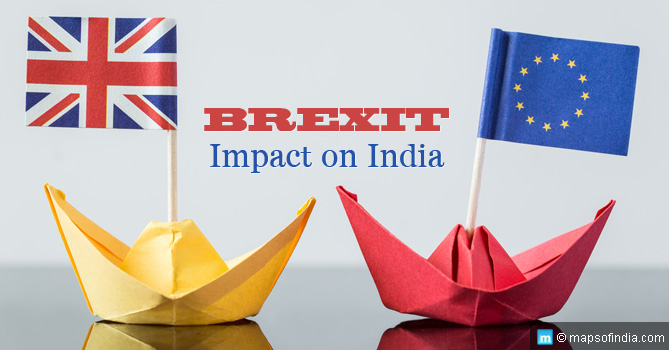 The results of Britain’s historic referendum to decide the country’s membership of the European Union (EU) are out and it is clear that a majority of the voters have opted out of the EU (51.8 percent votes in favour of ‘Brexit’). England, in particular, seems to have voted overwhelmingly in favour of Britain’s exit (popularly termed ‘Brexit’) from European Union while Scotland and Northern Ireland have backed the ‘Remain’ call. The results of the referendum are not legally binding on the government and authorities but in a highly politically conscious country such as the UK, it is unlikely that the politicians and administration shall defy the will of the masses. Even as the Brexit trend started to show up in the results, the GBP crashed to about USD 1.33 – the lowest it has been since 1985. The Sterling Pound also fell some 7 percent against the Euro to about EUR 1.2085. The Euro, in turn, also declined about 3.3 percent against the US Dollar – an unprecedented one-day fall since the currency was launched. The Financial Times Stock Exchange 100 Index (FTSE 100) could now drop by about 560 points or 8.8 percent, experts believe. British authorities estimate that exiting the EU will cause the economy to shrink by up to 5 percent by 2019 and up to 7.5 percent by 2030. While things look uncertain and gloomy back in the UK, let us take a look at the possible impact of the Brexit on India.
The results of Britain’s historic referendum to decide the country’s membership of the European Union (EU) are out and it is clear that a majority of the voters have opted out of the EU (51.8 percent votes in favour of ‘Brexit’). England, in particular, seems to have voted overwhelmingly in favour of Britain’s exit (popularly termed ‘Brexit’) from European Union while Scotland and Northern Ireland have backed the ‘Remain’ call. The results of the referendum are not legally binding on the government and authorities but in a highly politically conscious country such as the UK, it is unlikely that the politicians and administration shall defy the will of the masses. Even as the Brexit trend started to show up in the results, the GBP crashed to about USD 1.33 – the lowest it has been since 1985. The Sterling Pound also fell some 7 percent against the Euro to about EUR 1.2085. The Euro, in turn, also declined about 3.3 percent against the US Dollar – an unprecedented one-day fall since the currency was launched. The Financial Times Stock Exchange 100 Index (FTSE 100) could now drop by about 560 points or 8.8 percent, experts believe. British authorities estimate that exiting the EU will cause the economy to shrink by up to 5 percent by 2019 and up to 7.5 percent by 2030. While things look uncertain and gloomy back in the UK, let us take a look at the possible impact of the Brexit on India.
India – UK Trade Ties
To understand the impact of Brexit on India, we need to take a look at India’s trade ties with the UK. According to data from the Ministry of Commerce and Industry, India’s bilateral trade with Britain is estimated to be worth some USD 14.02 billion (2015-16). This includes USD 8.83 billion in exports and USD 5.19 in imports. This provides India a positive trade balance of about USD 3,64 billion. India is also the third largest foreign investor in Britain. In FY 2016 alone, India invested GBP 1.9 billion pounds (approximately USD 2.75 billion) in the UK. According to the Ministry of External Affairs, UK attracts more Indian investments than the rest of the EU together. Likewise, Britain is also the third largest source of FDI in the country. Over 800 Indian companies have offices in the UK, which allows them access to the rest of the EU. Given such close ties, it is inevitable that uncertainties and lingering doubts shall loom over Indian businesses and enterprises with stakes in the UK till full negotiations of the Brexit come to light.
India Could Benefit From Brexit
Despite fears of a negative impact, leading economists believe that a Brexit could potentially work out in favour of India. India’s traditionally strong trade ties with Britain could play out favourably in the years following the Brexit. Freeing itself from the European Union’s stringent trade guidelines and restrictions could enable Britain to cement existing ties with India and forge new trade pacts with it. UK is likely to have a much greater latitude and independence in negotiating new trade deals. Some areas that are likely to see enhanced cooperation are technology, cyber security, defence production and finance. It is also likely that a post-Brexit UK will be more inclined towards investing in emerging economies and India is likely to be a great potential beneficiary. With Britain exiting the EU, migration restrictions may come into play. This means that Britain will look at other English-speaking countries such as India to fulfill its need for talented and skilled labour. It remains to be seen though, if Britain is willing to slacken its tight entry restrictions anytime soon.
Portfolio Watch
Indian equity markets shall certainly feel the impact of the Brexit and experts believe that the resultant selloff in emerging markets (including India) is a certainty. While a number of stocks, especially those with high stakes in UK and the EU, may feel a sharp impact, economists also believe that the Brexit impact in general shall be short-lived. This will also present a great opportunity for investors to buy on dips. Here are some stocks to look out for and their risk exposure (in terms of the UK & the EU):
- Tata Motors (Jaguar Land Rover) – EU accounts for about 24 percent sales of Jaguar Land Rover (JLR). About 35 percent components are also sourced from Europe. Lack of free trade will attract more duties making JLR more costly and less attractive.
- Tata Steel – Has 12 steel production units in the UK accounting for GBP 2 billion turnover. UK forms base of steel exports to EU.
- Tata Consultancy Services – UK and EU are major markets. Operations in UK grew by 8.2 percent in FY 2016.
- Hindalco – EU is a major market and source of about 9 percent of its revenue.
- Motherson Sumi – About 60 percent revenue is earned from the EU.
- Bharat Forge – EU accounts for about 30 percent of total revenue. Has plants in Germany and UK. Brexit will test operations and ease of trade.
- Bharti Airtel – Currently the fastest growing Indian company in the UK. Brexit may severely affect UK operations.
- Marksans Pharma – Earns about 60 percent of revenue from UK and EU. Shrinking UK economy, unstable Euro may not bode well.
- Tech Mahindra – Owns the UK-based company Fintech. UK and EU are also major markets.
Wait And Watch
The results of the Brexit referendum are in. Britain is now likely to notify other EU members of its exit by the end of this month. Once it invokes Article 50 of the Treaty on European Union which details procedures for such a withdrawal, the nation will have a two year time period to negotiate the terms. Trade treaties, tariffs, immigration laws will need to be reworked and regulations redrawn. This will give Indian businesses ample time to work out a realignment strategy. While the short term volatility will be dealt with by the RBI, SEBI and the Finance Ministry, it seems that the mid- to long-term impact will be light. Union Finance Minister Arun Jaitley said, “We are well prepared to deal with the short and medium term consequences of Brexit. We are strongly committed to our macro-economic framework with its focus on maintaining stability. Our macro-economic fundamentals are sound with a very comfortable external position, a rock-solid commitment to fiscal discipline, and declining inflation. Our immediate and medium-term firewalls are solid too in the form of a healthy reserve position”. All that remains is for us to do is wait and watch and gauge the real impact of the Brexit even as Britain negotiates the terms of its withdrawal from the EU.





